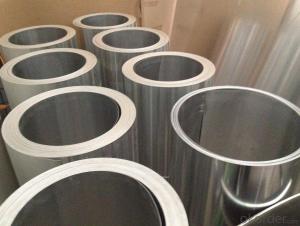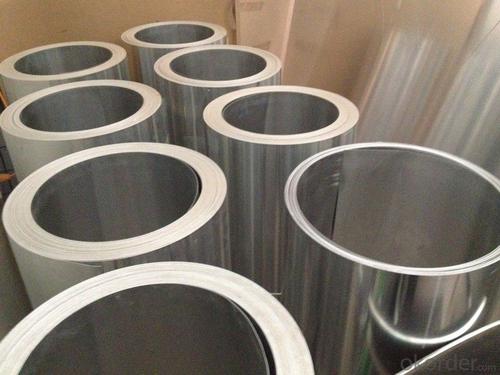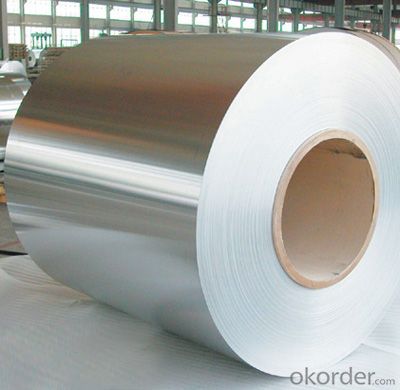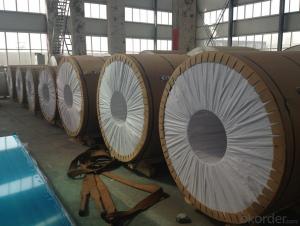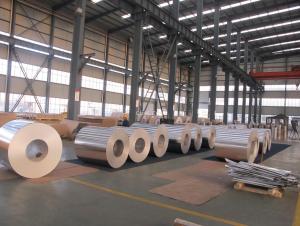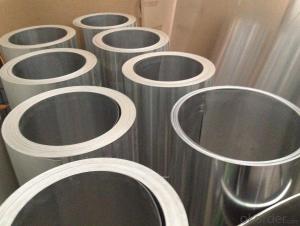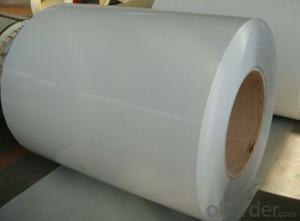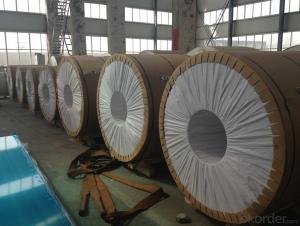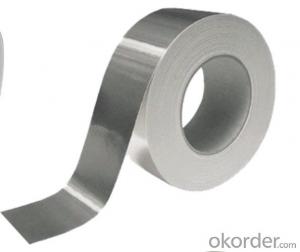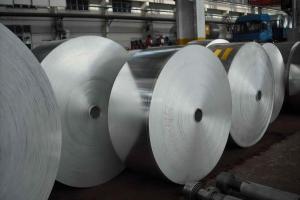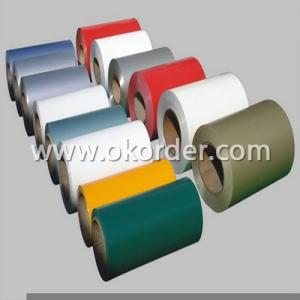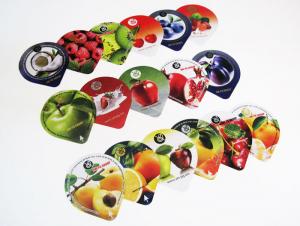Aluminum Prepainted Aluminum Coil for Manufacturing Gutter
- Loading Port:
- Shanghai
- Payment Terms:
- TT OR LC
- Min Order Qty:
- 5 m.t.
- Supply Capability:
- 100000 m.t./month
OKorder Service Pledge
OKorder Financial Service
You Might Also Like
Specification
Product Description
Commodity: Aluminum coil jumbo rolls
Alloy: 1050/1060/1100/1200/3003/3004/3005/3105/5005/5052/5754/5083/6061/8011
Temper: O, H12,H14,H16,H18,H22,H24,H32,H112,T6
Gauge: 0.2mm-8mm
CC and DC material with higher tensile strength and bigger elongation
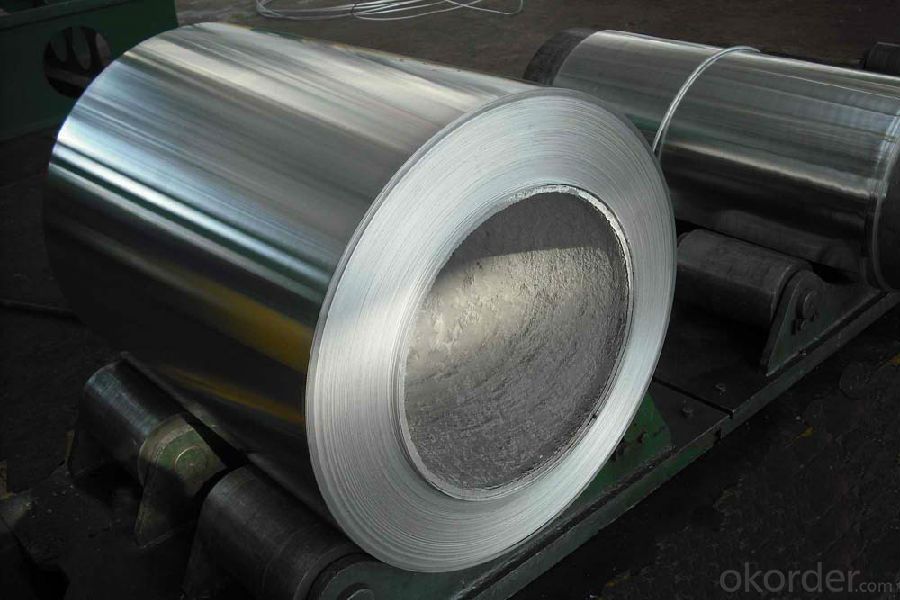
1.Specifications:
1. wood prepainted aluminum coil
for aluminium shutter
2. Aluminum Alloy: 3003H24, 3005H24, 3105H24 or 1 series, 5 series,
3. Thickness: any thickness range from 0.2mm to 1.5mm are available;
4. Width: any width range from 55mm to 1600mm are available;
5. Paint: PET, PVDF, Epoxy Resin;
6. Color: any color is available, as per your sample or our sample;
7. Coating hardness & adhesive: pensive hardness more than 2H; 1st grade adhesive;
8. Impact resistance: no cracking and peeling (50kg/cm, ASTMD-2794:1993)
9. Flexibility & MEK resistance: “T-bend”, 2T; MEK resistance more than 100;
Warranty: PET coating allows 5-10 years
10.Package: carton package and wooden pallet; 1Ton, 1.5Ton or 2 Tons as per your request;
11.Certificate: Certificate of origin;
Lidao Aluminum coil is mainly be used for roof, ceiling, curtain wall, al-plastic panel, aluminum veneers, perforated panel, aluminum tile, window, door, metal furniture, can or box for food,
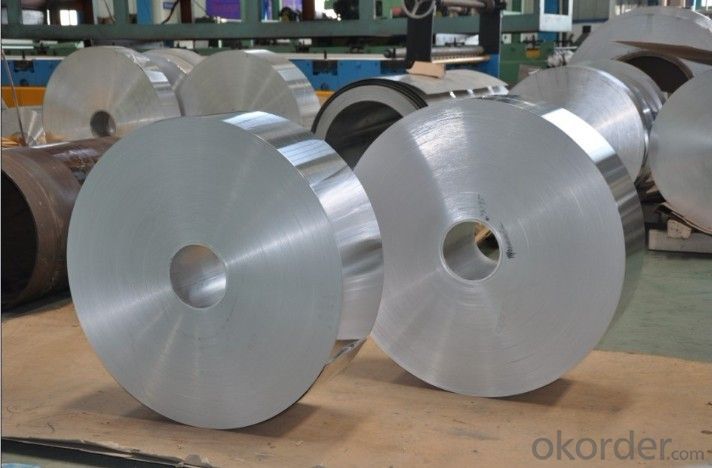
During the past years we have to import extra-wide coated aluminum coil for China market .In the year 2011 ,CNBM invest millions of usd introduce and establish a large new coating line with line speed 30 meters/secod ,which enable us to pre-paint aluminum coil with max width 2400mm.
CNBM 's team with 15 years experience ,is dedicated to each steps including quality inspection to materials ,pretrement ,coating
,baking,rooling,inspection and packing ,and make sure the coating layer is smoothl,durable,shiny and keep uniform color on different coils.
We learned sincerely from some of most famous container or truck manufacture in the world about their requirements on aluminum materials ,coating layer,color,size tolerance etc,and focus on all details about package storage and transport .
CNBM offer an new option for you.
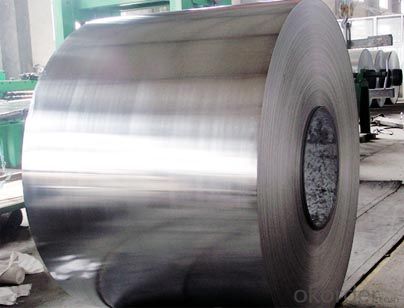
Our Services
CNBM is ready to assist with any product needs or enquiries. We value our customers and welcome your thoughts and feedback.
Please send comments, questions and requests through alibaba or our personal contact so they can be directed to the appropriate department.
About samples: Based on our company rules, a few samples are willing to be offered, but clients are requested to pay freight.
Working time:9:00~17:30(GM+8) from Monday to Friday, but you also can contact with us via personal contact information during our leisure time. We will try our best to offer you service in 24*7 hours.
Any quality, quantity problems are occured, response you will get in time not over more 24 hours after we recieve your complains. Problems will be solved in one week throught friendly negotiation.
FAQ
Q: Can you provide free samples?
A: Yes, free samples will be sent to you on freight at destination.
Q: Can I get your latest catalogue?
A: Yes, it will be sent to you in no time.
Q: What is the MOQ?
A: 5 tons
Q: What are your payment terms?
A: We accept L/C, D/A, D/P, T/T, West Union,etc.
If you are interested in our products, please do not hesitate to contact with us via following information
- Q: Does aluminum undergo corrosion when exposed to seawater?
- <p>Aluminum does not typically corrode in seawater due to its natural protective oxide layer. When exposed to air or water, aluminum forms a thin, dense layer of aluminum oxide on its surface, which prevents further corrosion. This passive layer makes aluminum highly resistant to corrosion in most environments, including seawater. However, under certain conditions such as in the presence of certain chemicals or extreme pH levels, the protective layer can be compromised, leading to corrosion. Generally, though, aluminum is considered a good material for marine applications because of its corrosion resistance.</p>
- Q: Describe the impact of silicon on the properties of aluminum alloys.
- <p>The addition of silicon to aluminum alloys significantly enhances their properties. Silicon increases the alloy's fluidity, which is beneficial for casting processes, leading to improved casting quality. It also raises the alloy's resistance to corrosion, particularly in marine environments. Furthermore, silicon additions can improve the alloy's mechanical properties, such as strength and hardness, without significantly compromising ductility. This makes the alloy more suitable for applications requiring wear resistance. However, it's important to note that excessive silicon can lead to a decrease in the alloy's toughness and increase the risk of hot cracking during casting.</p>
- Q: Is it possible to utilize aluminum as a material for automotive construction?
- <p>Yes, aluminum is commonly used in cars. It is valued for its lightweight properties, which can improve fuel efficiency and reduce emissions. Aluminum is used in various parts of a vehicle, including engine components, body panels, and suspension systems. Its high strength-to-weight ratio and resistance to corrosion make it an ideal material for automotive applications.</p>
- Q: Is it possible to create jewelry using aluminum as the primary material?
- <p>Yes, aluminum can be used to make jewelry. It is a lightweight, durable, and affordable metal that is often used in costume jewelry and fashion accessories. Aluminum's low cost and ease of shaping make it a popular choice for designers looking for a versatile material that can mimic the look of more expensive metals. However, it is not as strong or valuable as precious metals like gold or silver, and it may not be suitable for fine jewelry due to its lower durability and potential for oxidation.</p>
- Q: This question asks about the various applications of aluminum in construction materials.
- <p>Aluminum is widely used in building materials due to its lightweight, high strength, and resistance to corrosion. It is commonly used in window frames, door frames, curtain walls, and roofing systems for its durability and low maintenance requirements. Aluminum is also used in structural components such as beams and columns, and in the manufacturing of prefabricated buildings. Its malleability allows for the creation of various shapes and designs, making it ideal for both functional and aesthetic purposes in construction. Additionally, aluminum's thermal conductivity and reflectivity properties make it suitable for energy-efficient building envelopes.</p>
- Q: Is it safe and practical to use old aluminum cookware that has been stored for a long time?
- <p>Yes, you can reuse old aluminum cookware, but it's important to check its condition first. Look for any signs of damage, such as pits, scratches, or warping, as these can affect the cookware's performance and potentially release aluminum into your food. If the cookware is in good condition, clean it thoroughly and season it if necessary. Remember, aluminum cookware is not suitable for acidic foods or high heat, so use it accordingly to prolong its lifespan and maintain food safety.</p>
- Q: This question asks if there are differences in how long different types of aluminum cookware can last.
- <p>Yes, there are differences in the durability of different types of aluminum cookware. Anodized aluminum cookware is more durable and resistant to scratches and corrosion compared to non-anodized aluminum. Cast aluminum cookware is heavier and more durable than aluminum clad cookware, which is a layer of aluminum bonded to a stainless steel core. The thickness of the aluminum also affects durability, with thicker aluminum being more resistant to warping and lasting longer. Proper care and maintenance also play a significant role in the longevity of aluminum cookware.</p>
- Q: Is it safe to use aluminum cookware for cooking food?
- <p>Yes, aluminum can be used to make cookware that is safe for cooking food. Aluminum cookware is widely used due to its lightweight, durability, and good heat conductivity. While there were concerns about aluminum's potential health effects, current research indicates that the amount of aluminum leached into food during normal cooking is minimal and not harmful to health. However, it's important to avoid using abrasive cleaners or utensils on aluminum cookware to prevent scratching, as this could increase the amount of aluminum that might be released into food.</p>
- Q: What are the elements that make up aluminum oxide and what is its chemical formula?
- <p>Aluminum oxide is composed of aluminum and oxygen. Its chemical formula is Al2O3, indicating that it consists of two aluminum atoms (Al) and three oxygen atoms (O). This compound is a widely used industrial material, known for its high melting point and hardness.</p>
- Q: This question asks for a comparison of the positive and negative aspects of using aluminum as a material.
- <p>Aluminum has several advantages, including its lightweight nature, making it ideal for transportation and construction. It is also highly recyclable, with the recycling process requiring less energy compared to many other materials. Additionally, aluminum is corrosion-resistant, which extends the lifespan of products. On the downside, aluminum is less strong than some other metals, which can limit its use in certain applications. It also has a high thermal conductivity, which can be a disadvantage in situations where insulation is needed. Moreover, aluminum production is energy-intensive, contributing to environmental concerns.</p>
Send your message to us
Aluminum Prepainted Aluminum Coil for Manufacturing Gutter
- Loading Port:
- Shanghai
- Payment Terms:
- TT OR LC
- Min Order Qty:
- 5 m.t.
- Supply Capability:
- 100000 m.t./month
OKorder Service Pledge
OKorder Financial Service
Similar products
Hot products
Hot Searches
Related keywords
